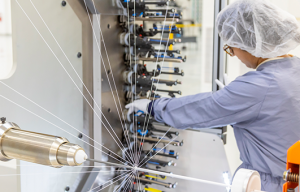
Cortland Biomedical launches state-of-the-art facility
A new 3D textile engineering technology has been developed by integrating traditional textile engineering with advanced biomaterials.

17th February 2016
Innovation in Textiles
|
Telford, PA
Secant Medical, the leading manufacturer of biomedical textiles and advanced biomaterials, has developed a new 3D textile engineering technology by integrating traditional textile engineering with advanced biomaterials.
While 3D printing or additive manufacturing has gained considerable attention as a novel method to create 3D biomedical forms, 3D printing does not always offer the dimensional stability, material selection and engineering properties desired, the company reports.
“Our 3D biomedical textile engineering technology offers a potential solution to help our customers’ resolve the complex challenges of biocompatibility, design and construction, and material properties,” said Jeff Robertson, President, Secant Medical. “Our company was built on innovation and this is just another example of the expertise we can provide to our customers.”
The 3D textile technology leverages Secant Medical’s long history in developing medical textiles for use in implantable medical applications. Once programmed, the 3D textile set-up can produce high-quality, mass-engineered structures with a high degree of repeatability, according to the company.
By combining the spatial resolution capability with advanced bioresorbable polymers, Secant Medical uses the company’s proprietary bioelastomer Regenerez to assist in enhancing the biomechanical properties of these 3D structures. This technology transforms a simple, synthetic textile into an elastomeric scaffold, which allows the researcher a broad range of bioresorbable polymers for the structural design.
The company has begun development of an anatomical scaffold prototype based on the trachea. The patent pending technology can provide the researcher with off-the-shelf scaffolds for a range of structures in various sizes to meet demographic demands, according to the manufacturer.
For instance, the 3D textile engineered trachea scaffold demonstrates the precision of creating 20 C-shaped rings stacked along the length of the prototype with narrow, flexible regions spaced in between to mimic the natural bioarchitecture of the trachea.
Secant Medical designs and manufactures biomedical textiles and advanced biomaterials for medical devices and pharmaceuticals. Employing medical fabric engineering technologies, we blend polymeric, metallic and resorbable biomaterials to create custom, high-performance structures that are used in the cardiovascular, general surgery, neurovascular, orthopedic and regenerative medicine fields.
Built on a 70-year history, the company is committed to the future of biomaterials and their role in the healing process and is actively engaged in research partnerships to advance next-generation biomaterial development.

Business intelligence for the fibre, textiles and apparel industries: technologies, innovations, markets, investments, trade policy, sourcing, strategy...
Find out more